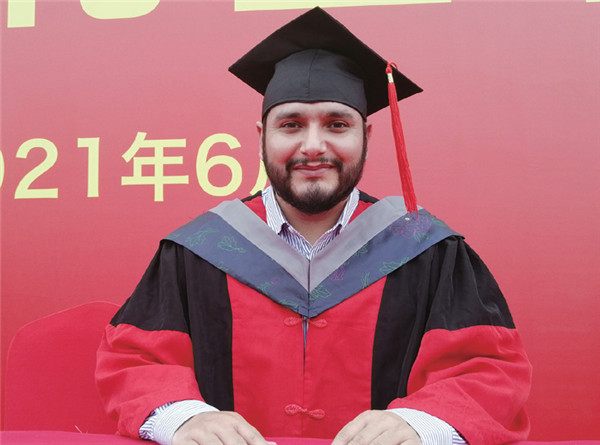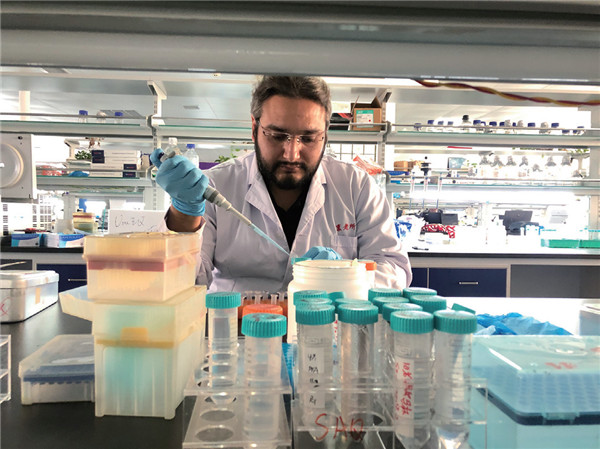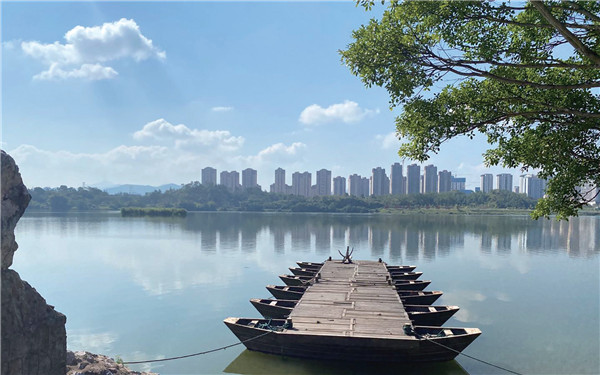新冠:一個轉變的契機
〔巴基斯坦〕 王旭 南昌大學

2020年跟我記憶中以前的新年一樣開始了。這是我在中國的第四個年頭。一如往常,隨著新年的到來,我有一種無法言説的興奮感,慶祝春節——中國年。我可以清晰地感覺到空氣中瀰漫著幸福、興奮和喜悅。不需要別人提醒,自己就能感受到節日的來臨。跟往年一樣,一個學期結束了,所有的考試也結束了,每個人都在準備回家過年。偶爾也聽到關於武漢有不明病毒在傳播的新聞,但是在春節這麼重要的節日,這樣的新聞阻擋不了大家回家的腳步。我清楚地記得1月21號的晚上,我遇到我的導師,他正準備回老家。他對我説:“照顧好自己,也照看好實驗室,再見。”然後實驗室最後一個小夥伴也回家了,只剩我一個人留在學校和實驗室。那個晚上,我們都不知道接下來會發生什麼。我把半年來收集的一直沒空看的電影、電視劇和書都整理好,準備好好休息一週,享受這個充實的學期之後的假期。我們不知道的是,計劃趕不上變化。
1月23日,中央對武漢等湖北城市實施封城。那一天,我們所熟知的世界改變了,衝擊著生活在中國的我們。中國,我的第二故鄉,正面臨歷史上最嚴峻的考驗之一。一種全新的冠狀病毒在人群中傳播,人們因之死亡,似乎沒有人知道接下來會發生什麼,局勢變得撲朔迷離。隔離等措施都迅速出臺,如果不是非常必要人們都不能出門。這是一種非同尋常、前所未有的情況。馬上就過年了,這樣要求人們真是不可想像。大多數人在外地工作學習,這是一年來唯一一個回家團聚的機會。然而,人們都響應政府的號召,待在家裏,努力保持冷靜。我在空氣中感受到的興奮變成了揪心的沉默,一種未知的、充滿焦慮和壓力的沉默。
自古以來,人類就在一起生活、一起工作,形成了一個相互依賴的社會。然而新冠的大流行,沒有人做好準備,也沒有人能預料到它的後果。在初期,它對經濟的影響還不能預估,但是文化上的衝擊已經讓人生畏。
在光明的未來,我們生活在一個擁抱人工智慧(AI)、機器學習(ML)和電腦視覺(CV)來幫助我們重塑生活的社會。在感知設備的幫助下,對超出人類能力範圍的事件進行監控。在電腦視覺和人工智慧的幫助下,我們不需要人工監測誰在打噴嚏,誰在咳嗽,誰在摸臉,誰在工作時沒有穿戴防護裝備。這是一個不需要人們冒危險就能完成偉大事業的未來,中國給了我們一個窺視這樣的未來的機會。
新冠肺炎疫情發生後,人工智慧研發領軍者百度研究院將其線性時間人工智慧演算法LinearFold開源給疫情防控中心、基因檢測機構和全球科研機構。它將新冠病毒RNA二級結構預測分析的時間從55分鐘縮短到27秒。中國領先的網際網路公司奇虎360于2月份發佈了“大數據遷移地圖”,用戶可以通過手機或電腦訪問該地圖,查看1月1日至今中國大陸的遷徙趨勢,有效地幫助社區和地方政府執行預防和防禦措施。鏈飛科技推出全國首個區塊鏈疫情監測平臺,可實時跟蹤各省新冠肺炎發病情況,並將相關疫情數據上傳,高效追蹤。阿里巴巴的達摩院開發了一種檢測新冠肺炎的人工智慧演算法,可以在20~30秒內閱片300~400張,準確率高達96%,而一個經驗豐富的醫生大約需要5~15分鐘才能閱一張。該系統疫情期間在中國160多家醫院使用,掃描了26萬多個臨床病例。此外,總部位於北京的初創企業Infervision開發了一款軟體,可以使用CT片子在50秒內檢測出與COVID-19等呼吸系統疾病相關的肺炎。全國45家醫院共篩查了76000多例疑似病例。人工智慧在地鐵站、火車站等人流密集、流動性較高的公共場所發揮作用。武漢高德紅外有限公司等提出了基於電腦視覺和紅外技術的新型測溫技術。這項技術使得在人們甚至不知情的情況下,以一種非接觸式、可靠和有效的方式測量體溫成為可能。相關應用不勝枚舉。

王旭在實驗室做實驗
但這不是全部。在媒體方面,中國還面臨著另一場戰爭。陰謀論開始流行。人權觀察組織宣稱將1100萬人封鎖是不人道的。外媒的一些不實宣傳在公眾中製造了不必要的恐慌和混亂。作為一名國際留學生,遠離家鄉和家人,我親身體驗了這種不必要的“抓眼球”。我作為我的祖國巴基斯坦的留學生,家人非常擔心我,他們聽説我們這裡被封了,沒有東西吃,不允許見面,等等。而真實的情況與人們的想像完全不同。是的,我們被封鎖了,但這是當下必要的措施。是的,我們不準出去,但這並不意味著我們會挨餓。我們大學在國際交流學院的宿舍開設了一個雜貨店,保障我們的需求。我們需要什麼,他們都會盡力滿足。他們是老師,這既不是他們的工作也不是他們的責任,但他們明白在這種特殊情況下需要特別的措施,他們做得很棒很成功。我永遠感激他們在那段時間裏為我們所做的一切。在這段艱難的時期,他們讓我們輕鬆了許多。一些學生在家人的堅持下必須回國,學校也為他們提供了方便。他們根據需要被送到機場或火車站。留下的學生得到了各種可能的照顧。給我們發了溫度計來持續監測體溫,讓我們向管理部門報告,還定期給我們發口罩。老師也不斷地問我們是否有什麼問題或需要什麼幫助。

江西于都長征渡口 / 王旭提供
保持距離是對抗冠狀病毒暴發的唯一有效預防措施,但也增加了人們的焦慮和壓力。作為一名國際留學生,待在宿舍裏,一個人度日越來越難。正常情況下,三四個月是一段很長的時間,可以培養愛好或技能,達到中等水準。但這次我們都沒有準備好。在這種不確定中生活了兩周後,我覺得有必要好好規劃一番。我為我的飲食和學習制定了時間表並強迫自己去遵守。我註冊了一個線上課程來讓自己把更多的時間用於學習。由於社交媒體和新聞媒體傳播的東西消極的居多,我也決定減少在這些平臺上的時間。我試著保持積極的狀態,花更多的時間用於閱讀與我博士研究相關的東西和我書單裏面的書,與我的家人、祖國和中國的朋友視頻,同時也更多地了解COVID-19。慢慢地,情況變得越來越好。

南昌大學 / 王旭提供
處理如此重大的危機需要在幾毫秒內做出成千上萬個小決定,而人力有盡時。因此,我們必須擁抱未來。我們一直都太害怕把控制權交給更有效率的東西——機器。中國的實踐證明,新一代資訊技術具有獨特優勢,在應對重大公共衛生挑戰中可以發揮重要作用。在中國取得巨大成功後,中國公司正在將這些技術推廣到全球正在應對疫情的國家。其他面臨新冠肺炎疫情的國家應該借鑒中國的經驗,運用科技手段打贏這場戰爭。新冠肺炎疫情的暴發和向大流行的轉變提醒了人類,我們的利益是相互交織的。我們必須分享經驗教訓,共同努力。我們人類,正面臨著失去親人的痛苦,無法緩解他們的傷痛以及無助的悲傷。然而我們不應該麻木,我們要採取措施,保持敏銳,竭力避免任何基於種族、膚色、民族、宗教、國籍的仇恨和歧視。我們要摒棄小我,團結起來對抗這場災難,只有這樣我們才有機會讓這個世界變得更美好。
時光不會倒流。冠狀病毒大流行不是一個事件,而是一個轉變的契機,一個讓人類文明發生我們一直都不敢去擁抱的轉變的契機。這種轉變會導致恐懼,如果我們做好準備,則是可以避免的。它改變了我們,但我們還活在過去就過時了。活在當下,我們要面向未來。雖然病毒的流行是一場災難,但它也為我們一直忽視的東西打開了一扇大門。用霍金的話來説:“無論生活看起來多麼艱難,總有一些事情你可以做,並取得成功。重要的是永不言棄。”
現在,我們正在慢慢恢復。學校重新開學了,企業也開始運轉。空氣中的寂靜仍然存在,然而,我們在這黑暗隧道的盡頭已經看到了希望。光明將再次照耀,而這哀傷的沉默將變為興奮、歡樂和幸福。
COVID-19: A Turning Point
〔Pakistan〕 Khan Abdul Haseeb, Nanchang University
The year 2020 came the same as the previous new year in my memory. This was my fourth year in China. As usual, with the arrival of the new year, I have an unspeakable sense of excitement to celebrate the Chinese Spring Festival. I can clearly feel happiness, excitement and joy in the air. You can feel the festive atmosphere without being reminded by others. As in previous years, a semester came to an end, all the exams were over, and everyone prepared to return home for the Chinese New Year. Occasionally I heard news about the spread of unknown viruses in Wuhan, but such news can’t stop everyone from going home on such an important festival as the Spring Festival. I clearly remember that on the night of January 21, I met my mentor, who was to return to his hometown. “Take care of yourself and take care of the laboratory, bye,” he said to me. Then the last my lab mate left the laboratory for home, leaving me alone in the school and at the lab. That night, none of us knew what would happen next. I put together a collection of movies, TV dramas and books I had no time to watch over the past half a year. I was ready to take a week off and enjoy the holidays after a busy semester. What we didn’t know is that plans can’t keep up with the change.
On January 23rd, the central government decided to lock down Wuhan and other cities in Hubei Province. That day, the world as we know it changed and hit the people living in China. China, which is my second home, was facing one of the toughest tests in its history. A brand-new coronavirus was spreading among the population, people were dying because of it. No one seemed to know what was going to happen next, and the situation became complicated. Quarantines and other measures were quickly put in place, and people were asked not to leave their homes if not necessary. This was an extraordinary and unprecedented situation. It was unthinkable to demand people to do this when it was almost New Year’s Eve. For many people who worked and studied abroad, this was the only opportunity of the year for them to return home and reunite with their family. However, people chose to react the government’s call and stay home without being nervous. The excitement I felt in the air turned into a heart-wrenching silence, a silence of the unknown, full of anxiety and stress.
Since ancient times, humans have lived together, worked together and formed an interdependent society. Yet no one was prepared for the COVID-19 pandemic, and no one could have predicted its influence. In the early days, the economic impact of the pandemic could not have been predicted, but its culture shock was already daunting.
In the future, we will live in a bright society that embraces artificial intelligence (AI), machine learning (ML) and computer vision (CV) to help us reshape our lives. With the help of sensory devices, we can monitor events beyond human capabilities. With the assistance of CV and AI, we don’t need to manually monitor who is sneezing, who is coughing, who is touching their face, who is working without protective gear. It will be a future where great things can be accomplished without people taking risks, and the pandemic gives us a glimpse into such a future in China.
After the outbreak of the pandemic in China, Baidu Research Institute, a leader in AI research and development, open-sourced its LinearFold – a linear-time AI algorithm – to disease prevention and control centers, genetic testing organizations and research institutions around globe. It reduced the time for predictive analysis of the RNA secondary structure of neo-coronavirus from 55 minutes to 27 seconds. Qihoo 360, a leading Chinese internet company, released its “Big Data Migration Map” in February, which users can access from their cell phones or computers to view migration trends in Chinese mainland from January 1, helping communities and local governments implement preventive and defensive measures. Wing Chain Technology launched the nation’s first blockchain epidemic monitoring platform, which can track the incidence of new cases in each province in real time and upload relevant epidemic data for tracking. Alibaba’s Dharma Institute developed an AI algorithm for detecting neo-coronary pneumonia that can read 300-400 films in 20-30 seconds with an accuracy rate of 96%, while it takes an experienced doctor about 5-15 minutes to read one. The system was used in more than 160 hospitals in China during the outbreak, scanning more than 260,000 clinical cases. In addition, Beijing-based startup Infervision developed a software that can detect pneumonia associated with respiratory diseases such as COVID-19 in less than 50 seconds by using CT slices. More than 76,000 suspected cases have been screened at 45 hospitals nationwide. AI plays a role in public places with high traffic and mobility, such as subway stations and train stations. Wuhan High-Tech Infrared Co. Ltd. and other companies have proposed a new temperature measurement technology based on CV and infrared technology. This technology makes it possible to measure body temperatures in a non-contact, reliable and effective way without people even knowing about it. Related applications are numerous.
Meanwhile, that is not the whole picture. China is facing another war on the media reporting. Conspiracy theories began to emerge. Human Rights Watch claimed that the blockade of 11 million people was inhumane. Some false propaganda in the foreign media created unnecessary fear and confusion among the public. As an international student, far from home and family, I experienced this unnecessary “eye-catching” first-hand. As an international student in my home country of Pakistan, my family was very worried about me, they heard that we were closed, no food, not allowed to meet, and so on. And the real situation was completely different from what people think. Yes, we were blocked, but it was a necessary measure at that moment. We weren’t allowed to go out, but that didn’t mean we were going to starve. Our university has opened a grocery store in the International Exchange College dormitory to safeguard our needs. Whatever we need, they tried to meet it. They were teachers and it was neither their job nor their responsibility, but they understood that special measures were needed in this particular situation and they did a great and successful job. I am forever grateful for all they did for us. They made it so much easier for us during this difficult time. Some students had to return home at the insistence of their families, and the school made it easy for them. They were transported to the airport or train station as needed. The students who stayed behind were cared for in every possible way. We were given thermometers to check our body temperatures and to report to the college authorities. We were given masks on a regular basis. Teachers also constantly asked if we had any questions or if we needed any help.
Keeping your distance is the only effective preventive measure against COVID-19 outbreaks, but it also increases anxiety and stress. As an international student, it is increasingly difficult for me to stay in a dorm and spend my days alone. Normally, it takes three to four months to develop a hobby or skill and reach a moderate level. But none of us were ready for that. After two weeks of living in uncertainty, I felt the need to plan things out. I set up a schedule for my diet and studies and forced myself to follow it. I signed up for an online course to allow myself to devote more time to my studies. Since social media and news media spread mostly negative things, I decided to spend less time on these platforms. I tried to stay positive and spend more time reading materials related to my PhD research and books on my book list, videoing with my family, friends in my home country and China, and also learning more about COVID-19. Slowly things got better and better.
Dealing with a severe crisis requires thousands of small decisions to be made in milliseconds, and there is a time when human capacity is exhausted. Therefore, we must embrace the future. We have been too afraid to hand over control to something more efficient - machines. China’s practice has proven that the next generation of information technology has unique advantages and can play an important role in addressing major public health crises. After great success in China, Chinese companies are extending these technologies to countries around the world that are dealing with outbreaks. Other countries facing the COVID-19 outbreak should learn from China’s experience and use technology to win the war. The outbreak of pandemic and its spread remind humanity that our interests are intertwined. We must share lessons learned and work together. We are facing the pain of losing loved ones, the inability to relieve their trauma and the grief of helplessness. Yet we should not be numb, we have to take steps to stay sharp and do our best to avoid any hatred and discrimination based on race, color, ethnicity, religion and nationality. We have to abandon our ego and unite against this disaster, only then we can have a chance to build this world a better place.
Time does not go backwards. The pandemic is not a single event, but an opportunity for transformation and turning point to make a shift in human civilization that we have been too afraid to embrace. This shift may lead to fears that could have been avoided if we had been well prepared. It changes us, but we are obsolete if we are still living in the past. Living in the present, we need to look to the future. While the epidemic is a disaster, it also opens the door to something we had been ignoring. In the words of Stephen Hawking: “No matter how hard life seems, there is always something you can do and succeed.The important thing is to never give up.”
Now, the things are slowly recovering. Schools are back in session, and businesses are up and running. The silence in the air is still there, yet we have seen hope at the end of the dark tunnel. The light will shine again, and this mournful silence will turn back to excitement, joy and happiness.



